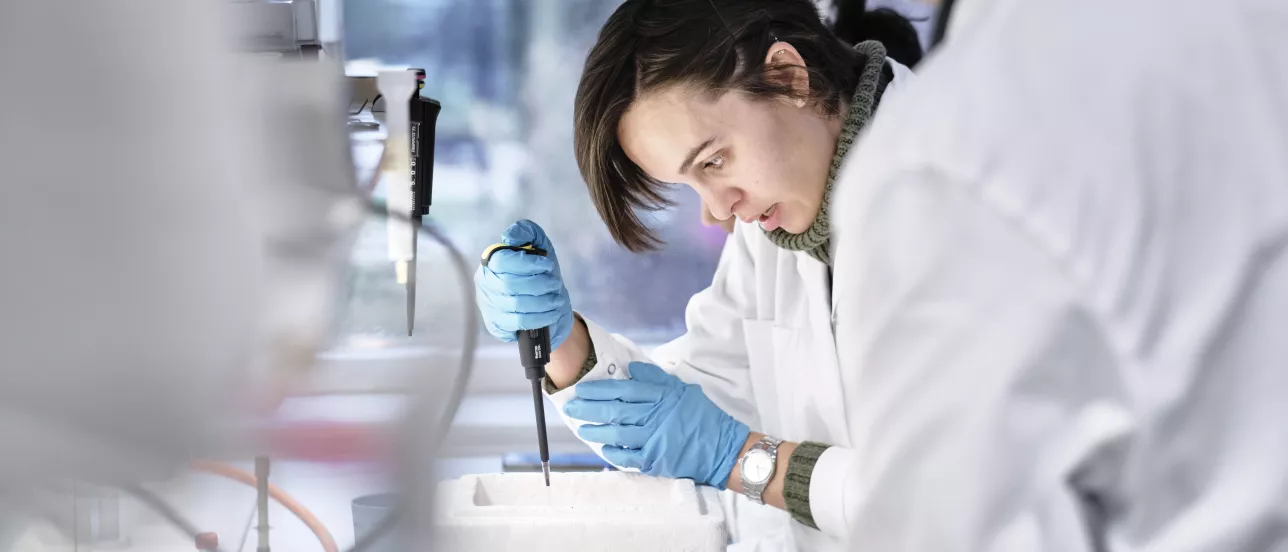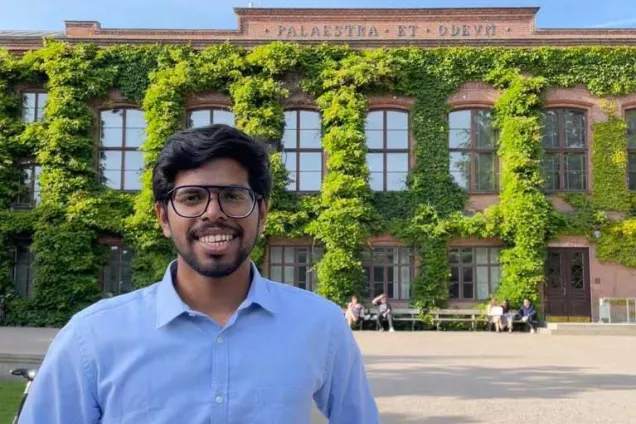Molecular Biology, Immunology and Infection Biology - Master Programme
Master's programme · 2 years · 120 credits

Description
Pandemics, drugs and disease treatments. There are many examples of current societal issues where professionals with expertise in medical biology are needed. Our master’s programme equips you for a career in academia or research-intensive industries.
This interdisciplinary programme aims to give students of molecular biology a solid foundation for a career in areas related to immunology and infection biology. These areas play an increasingly important role for sustainable development, including the ability of modern societies to address global public health problems of both infectious and non-infectious etiology.
The programme provides valuable knowledge in experimental design and analysing results. You will practice both oral and written presentations and obtain ample experience in working in groups. Teaching takes place on modern premises and in laboratories with advanced equipment. The Master’s programme has a high proportion of scheduled lessons, and the interaction with teaching staff and course assistants is relaxed.
The programme is conducted in an international environment and has strong ties with research. All of the teaching staff are researchers, and as a result the teaching is continuously adapted based on current research. The Department of Biology has several world-leading research teams and conducts both basic research and applied research. The language of instruction is English.
Programme structure
During the first semester of the master’s programme you will take compulsory courses on microbiology and immunology. The spring semester begins with a compulsory course on immunology and infection biology. During the final part of the semester you will take elective courses on e.g. pharmacology, antibiotics, microscopy, genetics and/or bioinformatics.
During the third semester you will take a course on neurobiology or another optional course and/or start your degree project. The degree project is worth 30, 45 or 60 credits and is conducted in a research team or at a company. If you decide to do a degree project worth less than the maximum number of credits, you can do a second project or take additional theoretical courses. There is also the possibility to do an internship, which can provide valuable professional contacts during the programme. Most of our students do their degree project at the Faculty of Medicine at Lund University.
Career prospects
The knowledge and skills you gain on this programme will open doors to employment in academia, public sector, government agencies, industry, and non-governmental organizations, both nationally and internationally. The programme also provides you with a solid ground for PhD studies.
Computers in the programme
The programme requires that you have access to a computer, preferably a laptop, on which you can install software mainly provided by the University, such as Microsoft 365, CAD/CAM and development environments for Python, Matlab or other computational tools. It can be either a Windows computer or a MacOS. On some courses you may need to buy or rent your own software.
Conditions in the study environment and during study visits and field studies
The programme contains compulsory elements that require you to be able to work independently and safely in a laboratory environment, in a hospital environment, in workshops, in production facilities, or during study visits and field studies. These elements require the ability to comply with safety regulations and instructions, and to move around in and evacuate premises safely. The elements also require the ability to monitor and control the processes studied.
Ethical concerns
The programme includes compulsory elements that some people may have concerns about, such as patient-centred activities in healthcare, animal testing or dissection. However, the student is obliged to acquire knowledge and skills in these areas as well, to the extent necessary to fulfil the learning outcomes of the course. For some elements, there might be specific requirements regarding rules on hygiene, the design of protective and work clothing, confidentiality and professionalism.
Closed for applications
Application opportunitiesClosed for applications
Learn more about our application periods and when to apply for studies at Lund University.
Contact
Study adviser
Therese Reber
Phone: +46462227316
Email: molbiol_master [at] biol [dot] lu [dot] se
Requirements and selection
Entry requirements
Specialisation: Immunology and Infection Biology
Bachelor’s degree of at least 180 credits or the equivalent, of which 120 credits must be in science/biomedicine/engineering, including:
45 credits in molecular biology comprising genetics, cell biology and microbiology
15 credits in human/animal physiology
30 credits in chemistry comprising biochemistry
Proficiency in English equivalent to English 6/B from Swedish upper-secondary school.
Selection criteria
English language requirements
Most of Lund University’s programmes require English Level 6 (unless otherwise stated under 'Entry requirements'). This is the equivalent of an overall IELTS score of 6.5 or a TOEFL score of 90. There are several ways to prove your English language proficiency – check which proof is accepted at the University Admissions in Sweden website. All students must prove they meet English language requirements by the document deadline, in order to be considered for admission.
How to prove your English proficiency – universityadmissions.se
Country-specific requirements
Check if there are any country-specific eligibility rules for you to study Bachelor's or Master's studies in Sweden:
Country-specific requirements for Bachelor's studies – universityadmissions.se
Country-specific requirements for Master's studies – universityadmissions.se
Apply
Start Autumn Semester 2025
Day-time Lund, full time 100%
In English
Study period
1 September 2025 - 6 June 2027
Application
Closed for applications
How to apply
Lund University uses a national application system run by University Admissions in Sweden. It is only possible to apply during the application periods.
Step 1: Apply online
- Check that you meet the entry requirements of the programme or course you are interested in (refer to the section above on this webpage).
- Start your application – go to the University Admissions in Sweden website where you create an account and select programmes/courses during the application period.
Visit the University Admissions in Sweden website - Rank your programme/course choices in order of preference and submit them before the application deadline.
Step 2: Submit documents
- Read about how to document your eligibility and how to submit your documents at the University Admissions in Sweden website. Follow any country-specific document rules for Master's studies or Bachelor's studies
Country-specific requirements for Bachelor's studies – universityadmissions.se
Country-specific requirements for Master's studies – universityadmissions.se
- Get all your documents ready:
- official transcripts and high school diploma (Bachelor's applicants)
- official transcripts and degree certificate or proof that you are in the final year of your Bachelor's (Master's applicants)
- passport/ID (all applicants) and
- proof of English proficiency (all applicants).
- Prepare programme-specific documents if stated in the next paragraph on this webpage.
- Upload or send all required documents to University Admissions before the document deadline.
- Pay the application fee (if applicable – refer to the section below on this webpage) before the document deadline.
* Note that the process is different if you are applying as an exchange student or as a part of a cooperation programme (such as Erasmus+).
* If you have studied your entire Bachelor's programme in Sweden and all of your academic credits are in Ladok, you do not have to submit transcripts or your diploma when applying for a Master's programme. However, there may still be other documents you need to submit! See the link below.
* Svensk student?
Läs instruktionerna om att söka till ett internationellt masterprogram på lu.se
Programme-specific documents
In addition to the documents mentioned under Step 2, you must also submit a Summary Sheet when you apply to this programme.
Summary Sheet for the Master's programmes in Molecular Biology (PDF, 106 kB, new tab)
Tuition fees
Non-EU/EEA citizens
Full programme/course tuition fee: SEK 340 000
First payment: SEK 85 000
Citizens of a country outside of the European Union (EU), the European Economic Area (EEA) and Switzerland are required to pay tuition fees. You pay one instalment of the tuition fee in advance of each semester.
Tuition fees, payments and exemptions
EU/EEA citizens and Switzerland
There are no tuition fees for citizens of the European Union (EU), the European Economic Area (EEA) and Switzerland.
Application fee
If you are required to pay tuition fees, you are generally also required to pay an application fee of SEK 900 when you apply at the University Admissions in Sweden website. You pay one application fee regardless of how many programmes or courses you apply to.
- Paying your application fee – universityadmissions.se
- Exemptions from paying the application fee – universityadmissions.se
- Convert currency – xe.com
*Note that there are no tuition or application fees for exchange students or doctoral/PhD students, regardless of their nationality.
Scholarships & funding
Lund University Global Scholarship programme
The Lund University Global Scholarship programme is a merit-based and selective scholarship targeted at top academic students from countries outside the EU/EEA.
Lund University Global Scholarship
Within the framework of the Lund University Global Scholarship programme, the University also offers the African Research Universities Alliance (ARUA) Scholarship targeted at top academic students from selected African research universities.
Swedish Institute Scholarships
The Swedish Institute offers scholarships to international students applying for studies in Sweden at Master's level.
Scholarship information on the Swedish Institute website
Country-specific scholarships and funding options
Lund University has agreements with scholarship organisations and funding bodies in different countries, which may allow applicants to apply for funding or scholarships in their home countries for their studies at Lund University.
External scholarships
Testimonials

Meet our student ambassador
Read Marija's testimonial and chat with her via Unibuddy.

Meet our student ambassador
Read Oussama's testimonial and chat with him via Unibuddy.

"Gives you theoretical as well as practical knowledge"
Melina from Greece

"The professors are amazing scientists in their fields"
Rohit from India